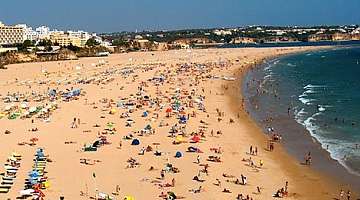Good News on the Tourism Front in Portugal

Tourism in Portugal
Published on
Portugal has, indeed, proven resilient in the face of the economic crisis gripping the European Union – or at least, its tourism industry continues to show signs of a strong recovery. Such a strong showing bodes well for the country mired in the past years in a crisis that necessitated a bailout from the Troika of the International Monetary Fund (IMF), the European Commission and the European Central Bank.
Statistics Portugal (INE) has released its latest facts and figures on the tourism industry.
Foreign tourists spent an additional 740,000 nights in national hotels across Portugal during May 2013 than in the same period last year. Overall, tourists spent 3.954 overnight stays in all hotels in the country of which over 3 million were foreign tourists – an increase from over 2.2 million in 2012.
Indeed, foreign tourists are on a roll in Portugal as evidenced by the 8.4 percent increase in their numbers. The Irish were largely responsible for the unexpected spike in the number of hotel guests – up by 40.8 percent by last year in comparison.
Other nationalities that visited Portugal included Brits, up by 22.3 percent; Germans, up by 21 percent; and Spaniards, up by 2.5 percent. It must be noted that Spain has an ailing economy yet its citizens still contributed to the spike in Portugal’s tourism industry.
But domestic tourists appeared to be less than enthusiastic. The number of domestic travellers decreased by 5 percent, a drop of 194,000 overnight stays in hotels across Portugal.
Italians, too, have visited the country in lesser numbers. Statistics point to a drop of Italian hotel guests by 106 percent – a substantial drop by international standards.
Despite these double drawbacks, the Portuguese tourism industry continues to show strong resilience even in the face of economic crisis – truly, a boost to the intensive efforts by the national and regional governments to encourage foreign and domestic tourists to visit the country’s pride and joy in tourist spots.
The national government in particular continues to be active in promoting Portuguese travel and tourism among its European neighbors. The programs in this regard appear to be working and it must be said that the country’s tourist spots are continuing to ear raves from foreign tourists.
Of course, the austerity measures imposed by governments across Europe including Portugal have affected tourist consumerism. Operators in the travel and tourism industry are offering increasingly competitive tourist packages with appealing products and services ostensibly to attract foreign and domestic tourists. Such increasing competitiveness among operators has certainly been a positive factor in the boost to the country’s tourism industry.
It is not just the mass market tourism sector that has seen an increase in tourists. Luxury tourism among affluent clients has also strengthened as evidenced by the high demand for top-notch packages in luxurious destinations. Hotels have also registered increased occupancy rates for their luxury accommodations, which is a good sign any way one looks at it.
The increase in mass market tourism can also be attributed to the efforts of low-cost carriers to offer attractive packages to their target customers. Low-cost airlines use effective and efficient marketing structures and strategies to encourage tourists to visit cities like Porto, Lisbon, Funchal and Faro. Many Portuguese are even encouraged to enjoy weekend city breaks, thus, adding to the increase in numbers for the country’s tourism industry.
With the increasingly positive outlook on economic recovery, insiders in the Portuguese tourism and travel industry are expecting positive changes as well. Difficulties may be encountered along the way but the outlook is, indeed, better than ever.
Published in: Portuguese Life / Travel